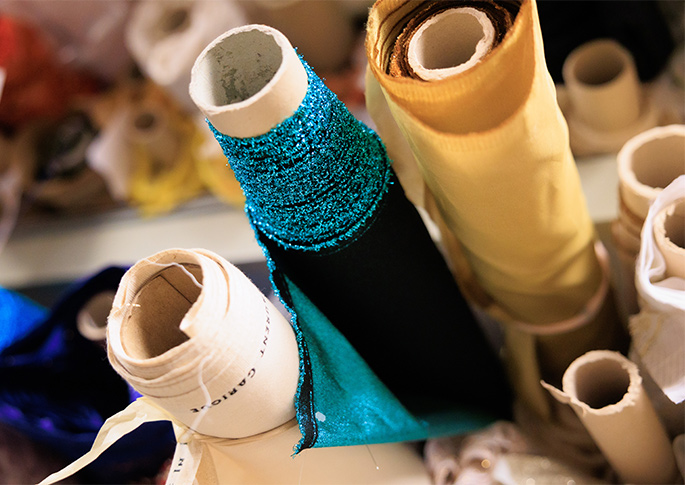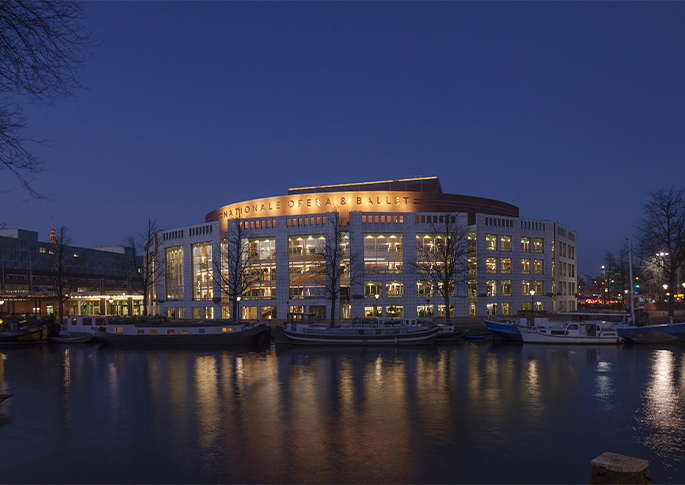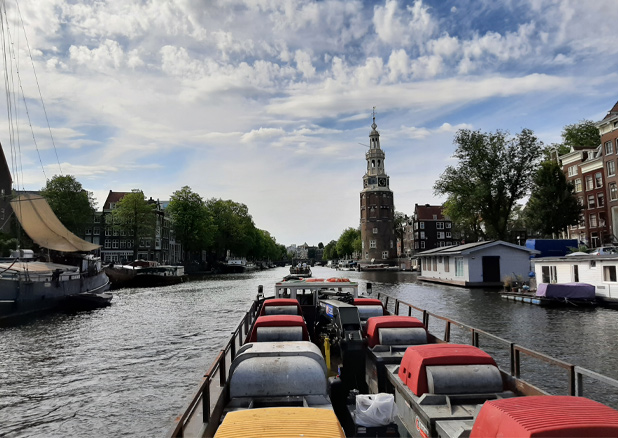Our sustainability efforts at a glance
At Dutch National Opera & Ballet (DNO&B), we have defined three levels to our sustainability drive: our productions, which are our core business, our buildings, which is where we undertake our activities, and our business practices, which are the procedures that facilitate our activities.

Photo: Liza Kollau
Productions
- We have mapped out our carbon footprint and the circularity of our productions by performing a scan of four previous productions (both opera and ballet).
- We have developed a sustainability screening tool, which we use to monitor the ecological footprint of our productions. This tool also allows us to help the production teams in the production workshop and the costume department to make more sustainable choices.
- We enclose a copy of the Green Deal, an environmental impact reduction programme for productions, with our contracts for artistic teams.
- We combine transports of sets and costumes as much as possible.
- We collaborate with partners in the international opera and ballet world to share our knowledge and progress towards achieving our sustainability targets.

Photo: Luuk Kramer
Buildings
- We aim for all our buildings to be fully outfitted with LED lighting by 2025. This has now been achieved in the production workshop; 70% of the Waterlooplein building is currently LED-lit.
- Both our buildings have an energy rating of ‘A’.
- The energy installations in our theatre were replaced with energy-efficient installations in 2018, the goal being to achieve a 30% reduction in carbon emissions per year.
- Both buildings are green electricity-powered, all of which is generated by Dutch wind and solar energy.
- The electricity use in our theatre building was down 18% in 2021 (baseline year: 2019). Nearly 4% is generated by the 350 rooftop solar panels.
- The electricity use in our production workshop was down 40% in 2021 (baseline year: 2019). 55% is generated by the workshop’s own rooftop solar panels.
- The production workshop is 100% gas-free; it is hooked up to the Amsterdam district heating network.
- Our Terms of Reference for renovation projects are based on BREEAM standards.
- We use sustainable building practices in our renovation of Studio Boekman, our new auditorium, which will be instrumental in our efforts to expand on our role in society by attracting wider audiences.
- In our theatre building, we are replacing as many plumbing fixtures as possible with water-saving alternatives.
- The towel rolls in the restrooms are made of 100% circular cotton.
- The rolls are longer, so that they do not have to be washed as often, which saves on transport and water.
- Worn towel rolls are recycled into cleaning cloths or insulation materials.
- We will be installing circular soap dispensers and towel dispensers: 80% of the dispensers have been refurbished and can be reconditioned to last at least another 14 years.
- We will start using two-ply toilet paper made from 100% recycled biodegradable fibres.
- We encourage our employees to take the stairs because elevators are energy guzzlers.
- We encourage our employees to conserve water and electricity.
- The production workshop has a garden and a sparrow colony to promote biodiversity.
- There is a bee colony on the roof of our theatre building; we harvest its honey once a year.

Waste transportation by electric boat
Business practices
- Our buildings were awarded the BREEAM ‘Good’ certificate in 2019.
- We hired a Sustainability Coordinator in April 2021.
- We adopted a sustainable purchasing policy in 2020.
- We separate our waste carefully. Most of this waste is transported by electric boat.
- We are exploring ways in which to give our textile waste a second lease of life.
- All our coffee machines serve climate-neutral fairtrade coffee and tea.
- We use ceramic cups.
- Coffee grounds are collected as organic waste, which is digested into biogas.
- The staff cafeteria has a new catering concept with much less packaging, and more fruits and vegetables. There is free tea, and still and sparkling water on tap.
- We encourage our employees to travel by public transport if at all possible.
- Electric bicycles are available for travelling to business meetings in the Amsterdam area.
- We support employees who want to work from home by offering a working-from-home scheme.
- We transport sets and costumes in our low-emissions biodiesel-fuelled truck, which is 90% more carbon-friendly than a regular truck. We have an electric van for smaller transports. This van is 100% green electricity-powered.
- Employees, suppliers and visitors can charge their electric vehicles at the four e-charging stations that have been installed outside the production workshop.
- We encourage our audience to take public transport whenever possible. For those driving, Slinger – our carpool app – makes it easy to share a ride.